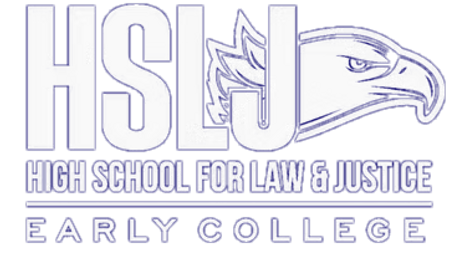
HSLJ
ACADEMICS
The academic program at High School for Law & Justice places an emphasis on every aspect of student growth and development, while meeting state requirements. Suitable class sizes and exceptional, qualified teachers allow us to offer a comfortable and inclusive educational environment, while ensuring each student receives the individualized attention and support they need.
The following are the academic courses provided by the High School for Law & Justice.
COURSES
ENGLISH
Pre-AP English I
Pre-AP English II
AP English Language
AP English Literature
On-Ramps Rhetoric
MATHEMATICS
Pre-AP Algebra I
Pre-AP Algebra II
Pre-AP Geometry
Algebraic Reasoning
Business Statistics
SCIENCE
Pre-AP Biology
AP Biology
On-Ramps Chemistry
Pre-AP Physics
On-Ramps Physics
Pre-AP Anatomy & Physiology
SOCIAL STUDIES
Pre-AP World Geography
Pre-AP World History
AP World History
AP Human Geography
US History
AP US History
Pre-AP US Government
AP US Government
ELECTIVES
REQUIRED ELECTIVES
Art (I & II)
Health
JROTC
Spanish (I &II)
Native Speaker Spanish
CRIMINAL JUSTICE ELECTIVES
Principles of Law
Law enforcement I
Law enforcement II
Criminal Investigation
Correctional Services
Forensic Science
LEGAL STUDIES ELECTIVES
Principles of Government
Political Science I
Political Science II
Court Systems
OTHER ELECTIVES
Practicum Law
Business Information Management (I & II)
Business Law
COURSE INFORMATION: ENGLISH
ENGLISH I: Focuses on writing for various purposes and modes, reading and analyzing texts from all genres of literature, and using the writing process to learn about themselves and the world.
English I Pre-Advanced Placement (HADV): Emphasizes close reading, analytical writing, and language skills essential for future academic and professional work. Students engage in close, critical reading of a wide range of materials and write essays, research papers, and analyses.
English II: Examines literary works from different countries and time periods, emphasizing interconnections between literary analysis, reading comprehension, and writing skills. Students collaborate and develop research skills.
English II Pre-Advanced Placement (HADV): Explores the human condition through novels, poetry, essays, and short stories. Students develop writing techniques, conduct research, engage in debates, and deliver oral presentations.
English III: Focuses on the American experience through the study of literature, emphasizing reading, speaking, listening, viewing, and writing skills. A syllabus details reading and writing assignments for each semester.
Advanced Placement Language and Composition (AP Lang): An introductory college-level rhetoric and composition class where students closely read and analyze texts, critique them in various written formats, and prepare for the AP English Language and Composition Exam.
English IV: Focuses on author's craft in connection with character, setting, structure, narration, and literary argumentation. Reading assignments range from pre-20th century works to present-day literature.
Advanced Placement Literature and Composition (AP Lit): Focuses on reading, analyzing, and writing about imaginative literature (fiction, poetry, drama) from various periods, preparing students for the AP Exam.
Each course is designed to enhance students' reading, writing, and critical thinking skills, preparing them for academic and professional success.
COURSE INFORMATION: MATH
Algebra I: Focuses on solving relevant and interesting problems by applying algebraic principles in real-world situations. Topics include the real number system, algebraic representation, functions, inequalities, and polynomials. Students take a statewide Algebra 1 STAAR Exam at the completion of two semesters.
Academic Geometry: Emphasizes the relationship between geometry and algebra to strengthen problem-solving abilities. Topics include congruence, geometric inequalities, similarity, right triangles, circles, constructions, areas and volumes, and coordinate and transformational geometry. Academic
Algebra 2: Prepares students for advanced mathematics. Topics include a review of Algebra I, complex numbers, quadratic functions, coordinate geometry, logarithmic and exponential functions, polynomial functions, sequences and series, and probability.
HADV Algebra 2: Focuses on applying algebraic principles in real-world situations. Topics include a review of Algebra I, quadratic functions and relations, systems of equations, numerical methods, exponential and logarithmic functions, rational and algebraic functions, sequences and series, and probability and statistics.
Pre-Calculus: Explores advanced topics of Algebra 2 and trigonometry. Trigonometry topics include trigonometric functions, radian measure, graphing trigonometric functions, and inverse trigonometric functions. Other topics include complex numbers, exponential and logarithmic functions, sequences and series, polynomial functions, and statistics and probability.
COURSE INFORMATION: SCIENCE
Biology: This general survey course presents the facts of biology within a pattern of unifying themes that helps students understand the more considerable significance of the details they are learning. Examples of themes studied are natural selection, reproduction and inheritance, development, structure and function, energy relationships, ecology, and science and society. Emphasis is also placed on developing critical thinking, laboratory, and writing skills. After two semesters of Biology I, students take a statewide end-of-course exam.
Academic Chemistry: Explore atoms, molecules, and compounds…and learn the difference between all those terms! Practice working in the lab, gathering data, and drawing conclusions.
Academic Physics: Academic Physics is a first-year comprehensive physics course covering all topics, including but not limited to the following: Mechanics, Thermodynamics, Waves and Sound, Light and Optics, Electrostatics, and Electricity and Magnetism. It is intended for students who want to learn physics more conceptually without emphasizing the more complex math concepts.


